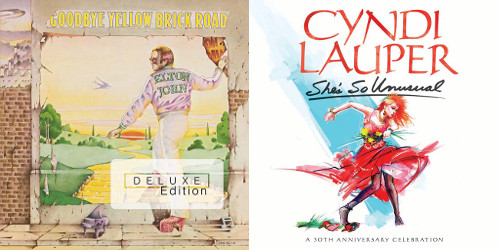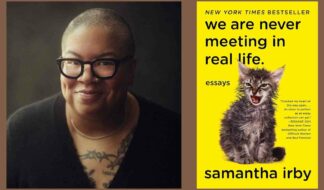
Cyndi Lauper, 'She's So Unusual'
Essayist Jancee Dunn (co-author of "Cyndi Lauper: A Memoir") sums up the influence, reach and enduring relevance of Cyndi Lauper's 1983 debut "She's So Unusual" with a single thought: "How many albums can you name that can be heard at both Pride parades and preschooler's birthday parties?"
While the track list represents much more than a re-release in its own right, Dunn's contribution sheds light on an era that would change pop music forever; her poignant essay is full of little-known history (she recalls Lauper sharing clothes and makeup with folks on the "Girls Just Wanna Have Fun" video set, resulting in a pinkeye outbreak). Diehards will also delight in the myriad funsies: Colorforms for dressing Cyndi in a "Girls" bedroom replica, new remixes of "Time After Time" and all sorts of previously unreleased rarities.
Before gelling into the punk-pop, reggae-inspired dance party it would become, there was the grungy guitar demo of "Girls," rough studio rehearsals ("All Through the Night" and "Money Changes Everything") and a version of "Time After Time" akin to the one you've heard many a time during a drunken night of karaoke, where some woman mumbles her way through everything but the chorus. But this isn't just some woman. This is the spunky spitfire herself, then already 30 years old, and she's a fantastic mess. When she drops what sounds like an f-bomb, it's completely emblematic of Cyndi's filterless character.
Those idiosyncrasies obviously manifest in the final studio version of Lauper's influential and monumental "She's So Unusual," so memorable and timeless, and bursting with loud colors, you sometimes forget the statements Lauper made: be yourself, be empowered, masturbate shamelessly. "She Bop," the then-controversial ode to self-pleasuring (Lauper actually did so during the recording of the song), was so fantastically coy it could have been a nursery rhyme. And, though many covers of it have come close to rivaling the original, there isn't a better version of "Time After Time" than Lauper's. From the bottom of her heart to ours, the ballad is testament to what is, and what's always been, special about a girl who just wanted to have fun and ended up breaking ground in the process. Grade: A
Elton John, 'Goodbye Yellow Brick Road'
When a work is so imbued into the fabric of pop culture, you forget how long it's been hanging around. Elton John's seminal "Goodbye Yellow Brick Road," the piano crooner's most successful recording, released in 1973, is over 40 years old. Yet, it feels like yesterday when you heard the jaunty celebrity satire "Bennie and the Jets" and his tribute to Marilyn Monroe, "Candle in the Wind."
Because you probably did just hear them then. Though the latter did experience a resurgence when it was popularized upon Princess Diana's death in 1997, the songs off "Goodbye Yellow Brick Road" are the epitome of timelessness. Exploring the big, bad fame monster, John's now-longtime writing partner, Bernie Taupin, would, with John, write nostalgic, melancholy musings foreshadowing the troubles of Elton's later years (according to the liner notes, John cried upon hearing this reissue). Unknowingly foreboding, it would become a classic for the reason many of the best albums do: It was ahead of its time.
As John explains in an interview contained in the liner notes, some people still don't know that "All the Girls Love Alice" is about a lesbian. Maybe they'll finally catch on after hearing a female – in this case, the great Emeli Sande – sing it; disc two of this "Goodbye Yellow Brick Road" remaster rallies a broad talent circle for some wonderfully reimagined interpretations.
Particularly notable is out troubadour John Grant's "Sweet Painted Lady," his baritone a welcome departure, and Hunter Hayes' near-faithful rendition of the title track. Particularly bad is the rap Wale throws down on Miguel's actually not-bad take on "Bennie and the Jets." On that same disc are highlights from a live Elton show circa 1973, making for a comprehensive release that is, very possibly and even if he didn't know it, the most significant work of Elton John's dazzling career. Grade: A-











